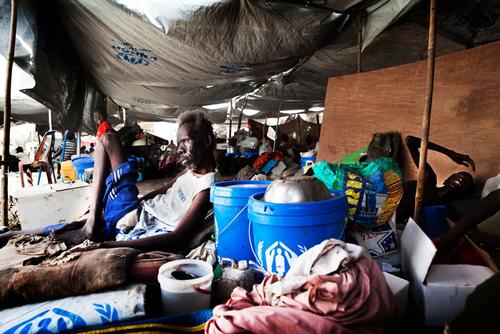MSF Canada’s Executive Director Stephen Cornish recently returned from South Sudan, where he witnessed first-hand the humanitarian crisis currently affecting the world’s youngest country. Over the course of his visit — during which he visited several Protection of Civilian camps managed by the UN's mission in South Sudan (UNMISS), where thousands of people have taken refuge from the violence that has swept across the country since last December — he maintained a blog diary, which was originally published by the Huffington Post.
This is one of his journal entries, chronicling his trips to the POC camps in Malakal, Melut and Bentiu, where Médecins Sans Frontières (MSF) is providing healthcare to those trapped inside with nowhere else to go.
When flying into Malakal, South Sudan, the swollen river of the White Nile can be seen meandering through lush green fields, which recent rains have coaxed from the once-parched red earth. A Protection of Civilians centre (POC) in the now-deserted capital of South Sudan’s Upper Nile state currently houses some 18,000 people, some of the 150,000 Malakal residents who fled after waves of violent and indiscriminate attack and counter-attacks convulsed the area.
The United Nations Mission for South Sudan (UNMISS), which was originally launched to help the young nation of South Sudan find its way, instead now provides the last site of refuge for civilians fleeing violence. Sadly, the living conditions are abysmal, with water and food in short supply, and most people confined to low-lying areas that have become a swamp of infestation and disease since the start of the rainy season. Inter-ethnic clashes, malnutrition and the recent scourge of cholera have only added to their misery.
UNMISS’s people in Malakal have, to their credit, managed to relocate two thirds of the camp’s residents to higher ground. But now the funds have run out, and the peacekeeping and humanitarian arms of the UN are locked in an administrative duel over who should pay to renovate the last sites for the remaining 8,000 souls crammed into these endless layers of mud — where ramshackle tents line paths filled with sewage and ditchwater, forming a cesspool that inches higher with every nightly rain. Some residents have beds, while others have built up their mud floors to help keep themselves dry. Others sleep on flimsy mats, which get soaked and leave people lying literally in their own refuse. Many people here have yet to begin to heal from the mental scars left by recent tragedy; they can fend off neither disease nor the waves of fear that come with the uncertain future they feel to be beyond their grasp.
A short zodiac ride down the Nile took us to Wau Shilluk, where a further 50,000 displaced people have taken refuge. Over the past weeks, a thousand cholera cases have been detected and nursed back to health in the Médecins Sans Frontières (MSF) cholera treatment centre (CTC) here. After weeks of intense effort, the deadly outbreak seems now to be subsiding: There are now only a few emaciated patients remaining in wards that once struggled to care for 50 at a time. With admissions dwindling, it is hoped the CTC can soon wind down. At the Wau Shilook ambulatory therapeutic feeding center (ATFC), meanwhile, staff members have been tirelessly coaxing toddlers — some 1,300 in recent months — to put on weight, helping them avoid the worst of the looming nutritional crisis.
MSF has been struggling to contain multiple medical scourges at its hospital inside the UNMISS camp. Crammed tightly with cases of malnutrition, kala azar, pneumonia and tuberculosis, the wards seem to overflow like the unending rains with the sick and infirm. Patients come from the camp, but also from other displaced populations farther up the Nile, where they are treated by our outreach clinics before being referred here.
The end of the day found us in Malakal town, touring the ransacked and eerily empty teaching hospital where 14 patients were not long ago executed in their beds. It is now hard to detect evidence of the high-performing surgery program where MSF and other organizations were only recently treating hundreds of wounded at the beginning of the conflict, just a few short months ago. One wonders if the soldiers who carelessly (and in contravention of the rules of war) targeted the hospital — or the looters who followed soon thereafter — feel even the slightest guilt for the after-effects of their acts: The teaching has ceased, the nursing and medical staff are all gone, and the centre of health referral for the entire region lays abandoned — wounded, silenced and paralyzed, like the fear which still hangs over the near deserted town.
The former residents of this place — whether of Shilluk, Dinka or Nuer ethnicity — all suffered at the hands of the fighters who have been waging an indiscriminate and vicious tug-of-war over Malakal. Those who are currently sheltered where aid has reached, in the POC sites and displacement camps, are the fortunate ones. Many tens of thousands more have yet to be reached by aid actors, and all face the upcoming hunger gap and an increasingly severe nutritional emergency, as well as the coming malaria and meningitis seasons. And even when the rains finally cease, they will also remain at the mercy of the continuing conflict, for as long as the guns keep ringing out of control.



